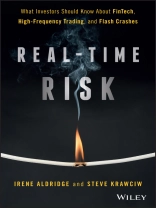Risk management solutions for today’s high-speed investing environment
Real-Time Risk is the first book to show regular, institutional, and quantitative investors how to navigate intraday threats and stay on-course. The Fin Tech revolution has brought massive changes to the way investing is done. Trading happens in microsecond time frames, and while risks are emerging faster and in greater volume than ever before, traditional risk management approaches are too slow to be relevant. This book describes market microstructure and modern risks, and presents a new way of thinking about risk management in today’s high-speed world. Accessible, straightforward explanations shed light on little-understood topics, and expert guidance helps investors protect themselves from new threats. The discussion dissects Fin Tech innovation to highlight the ongoing disruption, and to establish a toolkit of approaches for analyzing flash crashes, aggressive high frequency trading, and other specific aspects of the market.
Today’s investors face an environment in which computers and infrastructure merge, regulations allow dozens of exchanges to coexist, and globalized business facilitates round-the-clock deals. This book shows you how to navigate today’s investing environment safely and profitably, with the latest in risk-management thinking.
* Discover risk management that works within micro-second trading
* Understand the nature and impact of real-time risk, and how to protect yourself
* Learn why flash crashes happen, and how to mitigate damage in advance
* Examine the Fin Tech disruption to established business models and practices
When technology collided with investing, the boom created stratospheric amounts of data that allows us to plumb untapped depths and discover solutions that were unimaginable 20 years ago. Real-Time Risk describes these solutions, and provides practical guidance for today’s savvy investor.
Mục lục
Acknowledgments xi
Chapter 1 Silicon Valley is Coming! 1
Everyone is into Fintech 3
The Millennials are Coming 7
Social Media 9
Mobile 10
Cheaper and Faster Technology 13
Cloud Computing 14
Blockchain 15
Fast Analytics 15
In the End, It’s All About Real-Time Data Analytics 18
End of Chapter Questions 19
Chapter 2 This Ain’t Your Grandma’s Data 21
Data 21
The Risk of Data 23
Technology 27
Blockchain 30
What Elements are Common to All Blockchains? 31
Conclusions 39
End of Chapter Questions 39
Chapter 3 Dark Pools, Exchanges, and Market Structure 41
The New Market Hours 51
Where Do My Orders Go? 52
Executing Large Orders 54
Transaction Costs and Transparency 56
Conclusions 57
End of Chapter Questions 57
Chapter 4 Who is Front-Running You? 59
Spoofing, Flaky Liquidity, and HFT 64
Order-Based Negotiations 78
Conclusions 80
End of Chapter Questions 81
Chapter 5 High-Frequency Trading in Your Backyard 83
Implications of Aggressive HFT 89
Aggressive High-Frequency Trading in Equities 96
Aggressive HFT in US Treasuries 98
Aggressive HFT in Commodities 99
Aggressive HFT in Foreign Exchange 101
Conclusions 102
End of Chapter Questions 102
Chapter 6 Flash Crashes 103
What Happens During Flash Crashes? 104
Detecting Flash-Crash Prone Market Conditions 116
Are HFTs Responsible for Flash Crashes? 124
Conclusions 126
End of Chapter Questions 127
Chapter 7 The Analysis of News 129
The Delivery of News 130
Preannouncement Risk 139
Data, Methodology, and Hypotheses 143
Conclusions 154
End of Chapter Questions 154
Chapter 8 Social Media and the Internet of Things 155
Social Media and News 160
The Internet of Things 165
Conclusions 169
End of Chapter Questions 170
Chapter 9 Market Volatility in the Age of Fintech 171
Too Much Data, Too Little Time–Welcome, Predictive Analytics 174
Want to Lessen Volatility of Financial Markets? Express Your Thoughts Online! 175
Market Microstructure is the New Factor in Portfolio Optimization 176
Yes, You Can Predict T + 1 Volatility 178
Market Microstructure as a Factor? You Bet. 179
Case Study: Improving Execution in Currencies 183
For Longer-Term Investors, Incorporate Microstructure into the Rebalancing Decision 184
Conclusions 185
End of Chapter Questions 185
Chapter 10 Why Venture Capitalists are Betting on Fintech to Manage Risks 187
Opportunities for Disruption are Present, and They May Not Be What They Seem 189
Data and Analytics in Fintech 191
Fintech as an Asset Class 192
Where Do You Find Fintech? 194
Fintech Success Factors 194
The Investment Case for Fintech 196
How Do Fintech Firms Make Money? 198
Fintech and Regulation 198
Conclusions 200
End of Chapter Questions 200
Authors’ Biographies 201
Index 203
Giới thiệu về tác giả
IRENE ALDRIDGE is managing director and quantitative portfolio manager at ABLE Alpha Trading and president of ABLE Markets. She is author of Searching for High-Frequency Trading Opportunities and High-Frequency Trading.
STEVE KRAWCIW is CEO of ABLE Markets, a leader in market microstructure analytics. His experience comes from such firms as Mc Kinsey & Co. and Credit Suisse, and he is coauthor (with Irene Aldridge) of Quant Investor Almanac 2011.












